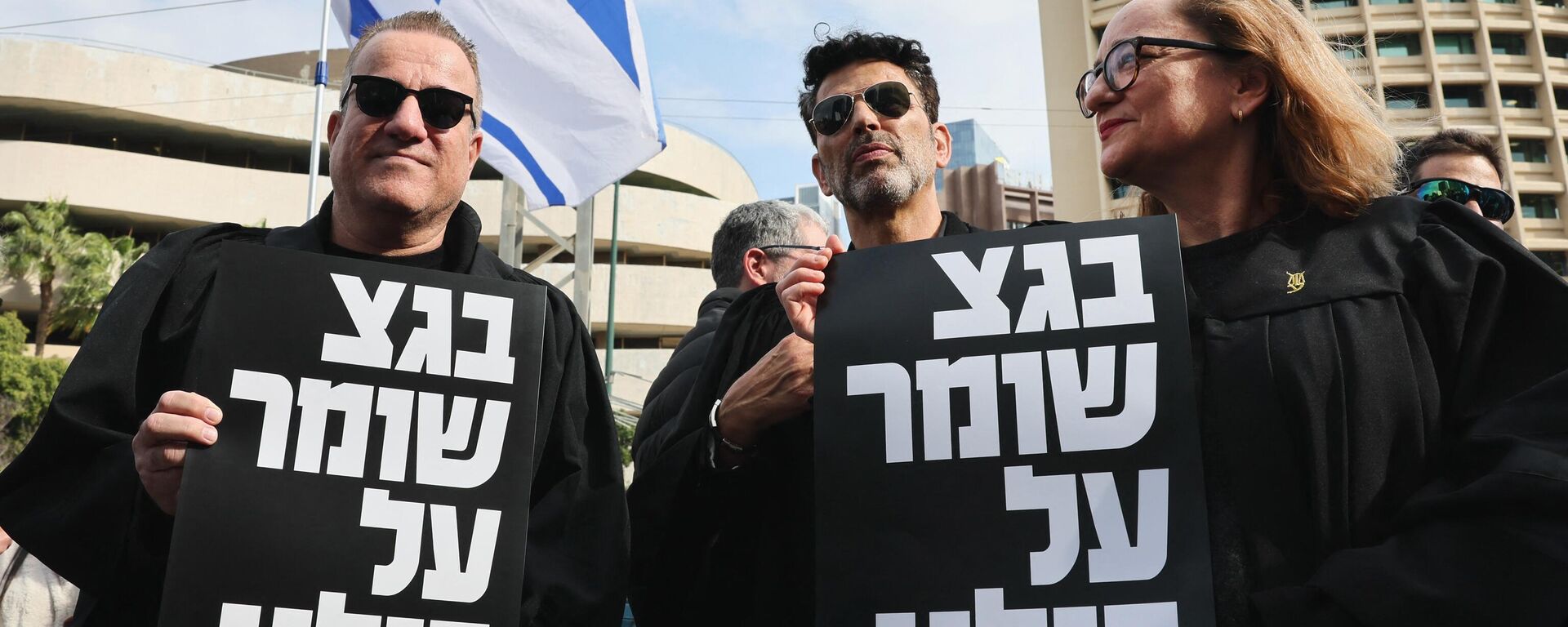https://sputnikglobe.com/20230225/netanyahus-office-defends-his-remark-about-people-protesting-judicial-reform-1107792647.html
Netanyahu's Office Defends His Remark About People Protesting Judicial Reform
Netanyahu's Office Defends His Remark About People Protesting Judicial Reform
Sputnik International
On Tuesday, the Israeli parliament supported a key part of a controversial judicial overhaul at first reading despite protests across the country against a bill that critics see as a threat to democracy.
2023-02-25T11:32+0000
2023-02-25T11:32+0000
2023-02-25T11:32+0000
world
israel
benjamin netanyahu
mass protests
protesters
government
judicial reform
https://cdn1.img.sputnikglobe.com/img/07e7/01/07/1106115141_0:0:2525:1421_1920x0_80_0_0_4dd1357ce2d3e33c6b6fe2be75ee55f8.jpg
Netanyahu’s office said that the Israeli prime minister spoke figuratively when he earlier said that he wants “to punch" and "beat” the protesters opposed to his government’s effort to overhaul the judiciary.Apart from signaling a readiness “to beat” the protesters, Netanyahu also likened them to those opposed to previous initiatives he endorsed as prime minister, including his acquisition of early COVID-19 vaccines during his last tenure.He added that “Just like they said then that the gas deal would cause damage, they also say today that’s what the reform will do. We must strike down the lie.”This came after Israeli lawmakers voted 63 to 47 earlier this week to support the government’s push for implementing judicial reform, which was unveiled by the government in early January.On January 4, Israeli Justice Minister Yariv Levin rolled out a legal reform package that would limit the authority of the Supreme Court by giving the cabinet control over the selection of new judges, as well as allowing the Knesset to override the court's rulings with an absolute majority, among other points.The planned overhaul sparked public criticism and prompted a wave of mass protests across Israel, with another rally scheduled to take place inTel Aviv later in the day.
https://sputnikglobe.com/20230116/thousands-of-students-protest-against-judicial-reform-in-israel-1106412762.html
israel
Sputnik International
feedback@sputniknews.com
+74956456601
MIA „Rossiya Segodnya“
2023
Oleg Burunov
https://cdn1.img.sputnikglobe.com/img/07e4/09/0b/1080424846_0:0:2048:2048_100x100_80_0_0_3d7b461f8a98586fa3fe739930816aea.jpg
Oleg Burunov
https://cdn1.img.sputnikglobe.com/img/07e4/09/0b/1080424846_0:0:2048:2048_100x100_80_0_0_3d7b461f8a98586fa3fe739930816aea.jpg
News
en_EN
Sputnik International
feedback@sputniknews.com
+74956456601
MIA „Rossiya Segodnya“
Sputnik International
feedback@sputniknews.com
+74956456601
MIA „Rossiya Segodnya“
Oleg Burunov
https://cdn1.img.sputnikglobe.com/img/07e4/09/0b/1080424846_0:0:2048:2048_100x100_80_0_0_3d7b461f8a98586fa3fe739930816aea.jpg
mass protests in israel, israeli prime minister benjamin netanyahu's office, israeli government's decsion to start judicial reform
mass protests in israel, israeli prime minister benjamin netanyahu's office, israeli government's decsion to start judicial reform
Netanyahu's Office Defends His Remark About People Protesting Judicial Reform
On Tuesday, the Israeli parliament supported a key part of a controversial judicial overhaul at first reading, despite protests throughout the country against a bill that critics see as a threat to democracy.
Netanyahu’s office said that the Israeli prime minister spoke figuratively when he earlier said that he wants “to punch" and "beat” the protesters opposed to his government’s effort to overhaul the judiciary.
“When the prime minister used the word ‘beat,’ he meant to strike at the untrue arguments of those who spread panic, and not to physically beat anyone,” the office explained.
Apart from signaling a readiness “to beat” the protesters, Netanyahu also likened them to those opposed to previous initiatives he endorsed as prime minister, including his acquisition of early COVID-19 vaccines during his last tenure.
“The same people who protested against the gas agreement or the coronavirus vaccines are the same people protesting today,” Netanyahu said, in an apparent nod to Tel Aviv’s deal with the US company Noble Energy on exploiting Israeli gas fields in 2015.
He added that “Just like they said then that the gas deal would cause damage, they also say today that’s what the reform will do. We must strike down the lie.”
This came after Israeli lawmakers voted 63 to 47 earlier this week to support the government’s push for implementing judicial reform, which was unveiled by the government in early January.

16 January 2023, 20:19 GMT
On January 4, Israeli Justice Minister Yariv Levin rolled out
a legal reform package that would limit the authority of the Supreme Court by giving the cabinet control over the selection of new judges, as well as allowing the Knesset to override the court's rulings with an absolute majority, among other points.
The planned overhaul sparked public criticism and prompted a wave of mass protests across Israel, with another rally scheduled to take place inTel Aviv later in the day.





